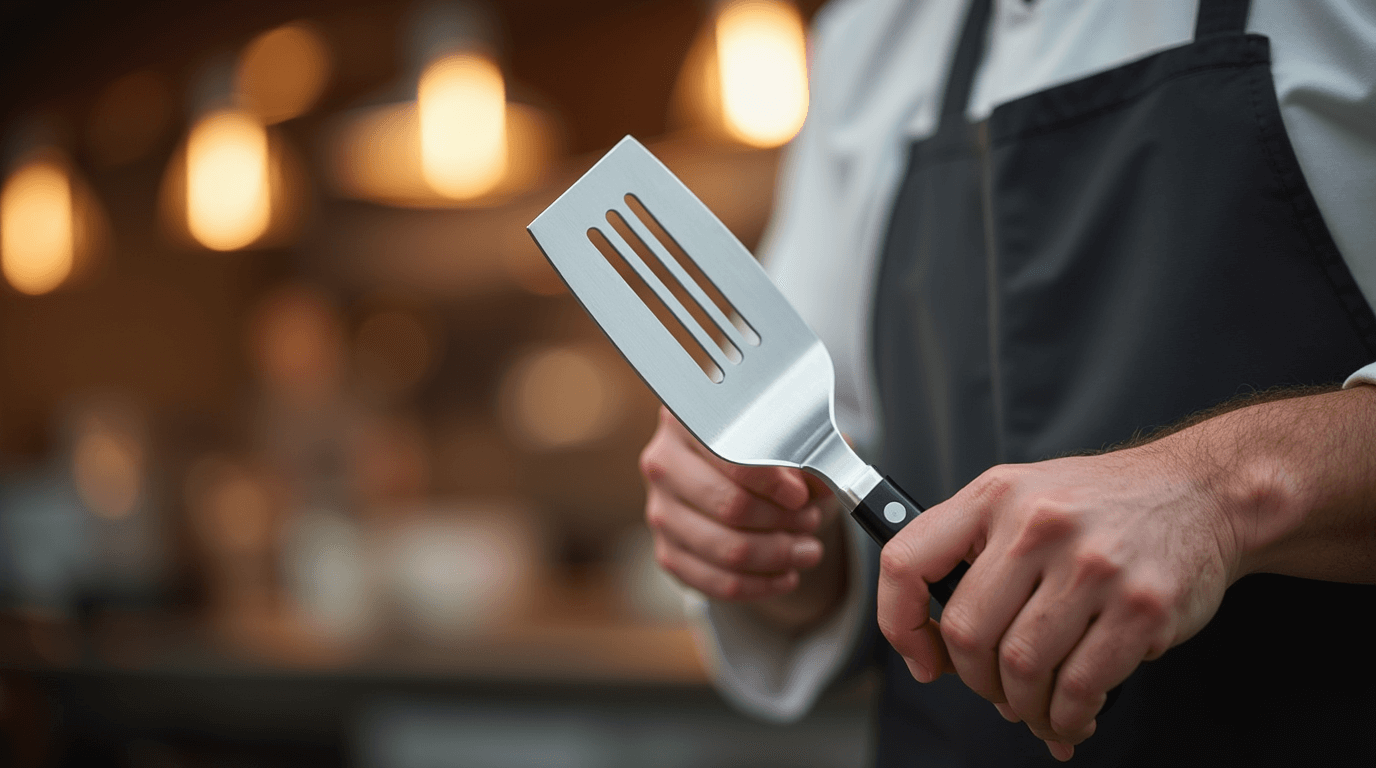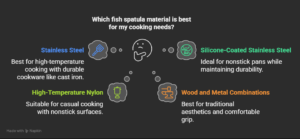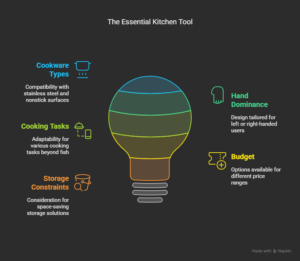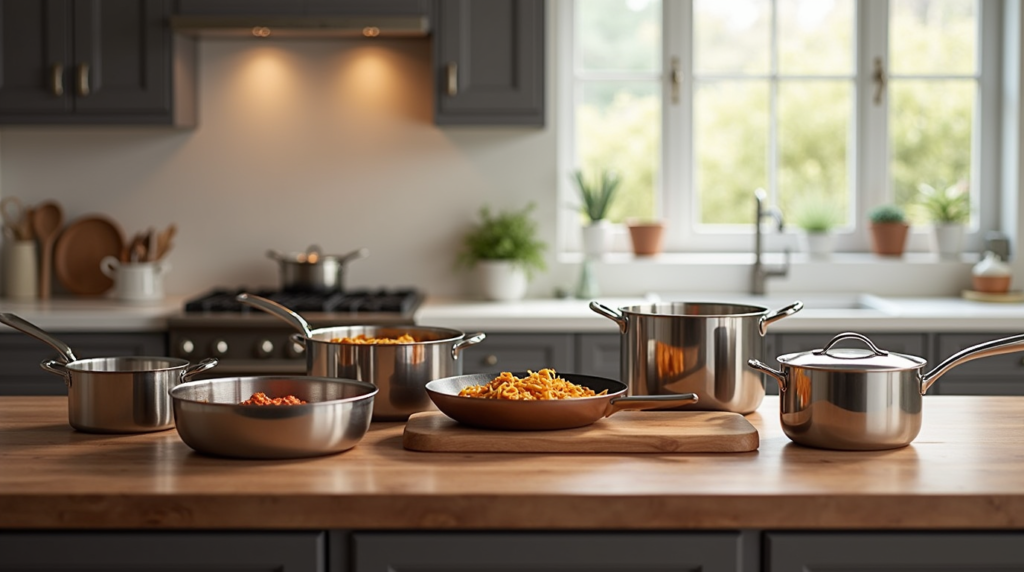
Fish Spatula: The #1 Amazing Kitchen Tool You’re Missing
This post may contain affiliate links. As Amazon Associates, we earn from qualifying purchases at no extra cost to you. We only recommend products we trust and love!
Have you ever struggled to flip a delicate fish fillet only to have it fall apart in your pan? Or watched in frustration as your pancake tears when attempting to turn it? The secret weapon professional chefs have been using for years might be missing from your kitchen arsenal: the fish spatula. This unassuming tool could revolutionize your cooking experience, whether you’re preparing seafood or not. Let’s dive into everything you need to know about this versatile kitchen essential.
What is a Fish Spatula, and How Is It Different from a Regular Spatula?
A fish spatula is a specialized kitchen tool designed with a thin, flexible, slotted metal blade that’s typically angled or offset from its handle. Unlike regular spatulas that often have thick, rigid blades, fish spatulas feature a distinctively slim profile with a slight curve that allows them to easily slide under delicate foods without damaging them.
The defining characteristics that set fish spatulas apart include:
- Thin, flexible blade: Slips effortlessly beneath fragile items like fish fillets
- Slotted design: Allows oils and liquids to drain while supporting food
- Angled or offset blade: Provides better leverage for flipping
- Beveled edge: Creates a sharp front edge that can get under foods more easily
- Longer length: Offers better reach and control when handling larger items
These design elements work together to create a tool that excels at handling delicate foods with precision and care. As one professional chef told us, “The fish spatula isn’t just for fish it’s practically the secret handshake of professional kitchens.”
Do I Need a Fish Spatula if I Don’t Cook Fish Often?
We hear this question constantly, and our answer is an emphatic yes! While its name might suggest a single-purpose tool, the fish spatula is arguably one of the most versatile implements you can add to your kitchen.
Even if fish rarely makes an appearance on your menu, you’ll find countless uses for this flexible friend:
- Flipping pancakes and crepes: The thin edge slides underneath without tearing
- Serving lasagna or casseroles: The wide surface area supports hefty portions
- Removing cookies from baking sheets: The flexible edge gently lifts without breaking
- Turning delicate vegetables: Handles fragile asparagus or roasted tomatoes with ease
- Flipping burgers and grilled sandwiches: Provides excellent control and support
Many home cooks tell us the fish spatula quickly becomes their go-to tool for nearly everything that needs flipping, turning, or serving. Its versatility makes it an essential addition to any kitchen, fish lover or not.
Can a Fish Spatula Be Used for Other Foods Like Pancakes or Burgers?
Absolutely! The fish spatula excels at handling a wide variety of foods beyond seafood. Its unique design makes it perfect for:
| Food Item | Why a Fish Spatula Works Well |
|---|---|
| Pancakes | Thin edge slides under easily without tearing; wide surface provides support |
| Eggs | Flexible blade conforms to pan surface; slots drain excess oil |
| Burgers | Long handle keeps hands away from heat; sturdy enough for heavier foods |
| Quesadillas | Wide blade supports the entire diameter; thin edge gets under cleanly |
| Cookies | Gentle flexibility prevents breaking; slots allow steam to escape |
| Grilled vegetables | Precise control for turning small or delicate items |
The versatility of a fish spatula makes it a true multitasking hero in the kitchen. I’ve replaced three different spatulas with just one good fish spatula, and I’ve never looked back. The slotted design and flexible blade make it perfect for almost any flipping, turning, or serving task.
What Materials Are Fish Spatulas Made Of, and Which Is Best?
Fish spatulas come in various materials, each offering different benefits depending on your cooking style and cookware. Here’s a breakdown of the most common options:
Stainless Steel
- Pros: Durable, heat-resistant, won’t rust or corrode, can handle high temperatures
- Cons: May scratch nonstick surfaces, can be heavier than other materials
- Best for: Cast iron, stainless steel, and carbon steel cookware
Silicone-Coated Stainless Steel
- Pros: Combines durability of metal with gentleness of silicone, safe for nonstick surfaces
- Cons: Less flexibility than pure metal versions, coating may wear over time
- Best for: Nonstick pans and coated cookware
High-Temperature Nylon
- Pros: Affordable, gentle on all cookware surfaces, dishwasher safe
- Cons: Less durable, can’t handle extremely high heat, less flexibility
- Best for: Casual cooks who primarily use nonstick cookware
Wood and Metal Combinations
- Pros: Comfortable grip, traditional aesthetic, good heat resistance
- Cons: Wood handles require special care, not always dishwasher safe
- Best for: Cooks who appreciate traditional tools and don’t mind hand washing

For most home cooks, we recommend a high-quality stainless steel fish spatula with a comfortable handle if you primarily use stainless steel or cast-iron cookware. If you use nonstick pans frequently, opt for a silicone-coated version to protect your cookware’s surface.
Are Fish Spatulas Safe for Nonstick Pans?
This is an important consideration for many home cooks. Traditional stainless steel fish spatulas are not recommended for nonstick surfaces, as their metal edges can scratch and damage the coating.
Fortunately, manufacturers have addressed this concern by creating nonstick-friendly alternatives:
- Silicone-coated fish spatulas: Feature the same slotted, thin design but with a protective silicone coating that won’t harm nonstick surfaces
- High-temperature nylon versions: Offer similar functionality with heat resistance up to about 450°F
- Composite materials: Some newer models use innovative materials that combine flexibility with nonstick safety
If your kitchen is equipped primarily with nonstick cookware, we strongly recommend investing in a silicone-coated fish spatula. This gives you the versatility and performance of a traditional fish spatula without risking damage to your valuable cookware.
How Do I Clean and Maintain a Fish Spatula?
Proper care ensures your fish spatula will remain a kitchen staple for years to come. Here are our recommended maintenance practices:
For Stainless Steel Fish Spatulas:
- Hand washing with warm, soapy water is ideal
- Dry thoroughly after washing to prevent water spots
- Most are dishwasher safe, but hand washing extends longevity
- For stubborn food residue, soak briefly before cleaning
For Silicone-Coated Spatulas:
- Check manufacturer’s instructions for dishwasher safety
- Avoid abrasive scrubbers that might damage the coating
- Inspect periodically for signs of coating wear
- Replace if the coating begins to peel or flake
For Wood-Handled Versions:
- Never soak wooden handles in water
- Hand wash only and dry immediately
- Occasionally apply food-safe mineral oil to wooden handles
- Store in a dry location to prevent warping or cracking
With proper care, a quality fish spatula can last for many years. We’ve found that the small effort of hand washing pays off in extended durability and performance.
What Size Fish Spatula Should I Buy for Home Cooking?
Size matters when selecting the perfect fish spatula for your kitchen needs. Most fish spatulas fall into these general size categories:
Standard (6-7 inches)
- Ideal for most home cooks
- Versatile enough for various foods and pan sizes
- Works well with 10–12-inch skillets
- Good balance between control and coverage
Large (7-8+ inches)
- Better for professional kitchens or enthusiastic home cooks
- Excellent for larger pans and grills
- Perfect for serving casseroles or lasagna
- Provides more support for bigger food items
Compact (5-6 inches)
- Great for smaller hands or cramped kitchens
- Offers more precise control for detailed work
- Works well with smaller cookware
- Easier to store in limited drawer space
For most home kitchens, we recommend a standard-sized fish spatula around 6.5 inches. This size provides the versatility needed for most cooking tasks while remaining manageable and easy to store. If you frequently cook for large groups or use oversized pans, consider sizing up to a larger model.
Top 5 Amazon Fish Spatulas: Find Your Perfect Kitchen Partner
After extensive testing and research, we’ve identified the five best fish spatulas available on Amazon. Each offers unique benefits to suit different cooking styles and preferences:
1. Misen Fish Spatula
- PROFESSIONAL-GRADE FOR HOME COOKS: Meticulously crafted from premium material for unparalleled durability and resilience…
- PRECISION IN EVERY FLIP: This wide-slotted turner is perfect for cooking a variety of meals. Whether it’s delicate eggs,…
- BPA-FREE AND HEAT RESISTANT: Cook with confidence knowing that Misen’s Fish Spatula is made from BPA-free materials and …
Key Features:
- Premium stainless-steel construction
- Perfectly angled blade for optimal leverage
- Comfortable, ergonomic handle
- Dishwasher safe design
Pros:
- Exceptional flexibility with sturdy support
- Professional-grade quality at a reasonable price
- Slotted design drains liquids effectively
- Versatile for multiple cooking applications
2. OXO Good Grips Stainless Steel Fish Turner
- Great for lifting, turning and transferring whole fish, filets, seafood cakes and more
- Sturdy, oversized, stainless steel head
- Beveled edge helps slide beneath foods
Key Features:
- Large, slotted head with beveled edges
- Non-slip, comfortable grip handle
- Sturdy stainless-steel construction
- Wide surface area for larger foods
Pros:
- Excellent for flipping larger items like whole fish or quesadillas
- Comfortable handle reduces hand fatigue
- Durable construction for long-term use
- Well-balanced weight distribution
3. GreenPan Silicone Fish Turner
- FLEXIBLE SILICONE: These tools have a smooth, blemish-free surface, holds its color longer, and keeps its shape for ever…
- HEAT-RESISTANT: The durable silicone construction is heat resistant up to 392˚F.
- ANTI-SLIP HANDLE: The wide grip & thumb ribbing are easier gripping and less slipping.
Key Features:
- Silicone-coated stainless-steel construction
- Safe for all cookware, including nonstick surfaces
- Heat resistant up to 392°F
- Dishwasher safe
Pros:
- Protects expensive nonstick cookware from scratches
- Maintains good flexibility despite silicone coating
- Easy to clean and maintain
- Versatile for various cooking tasks
4. Wusthof Gourmet Offset Slotted Spatula
- 6-1/2-inch offset slotted spatula with razor-thin flexible blade
- Stamped from a single piece of high-carbon stainless steel
- Synthetic polypropylene handle riveted for durability
Key Features:
- 6.5-inch precision German-crafted blade
- Ergonomic handle design
- Premium stainless-steel construction
- Perfect balance and weight
Pros:
- Exceptional quality and craftsmanship
- Ideal angle for flipping delicate foods
- Comfortable grip reduces fatigue
- Will last for many years with proper care
5. Winco Fish Spatula
- Quality brushed stainless steel, w/securely riveted smooth wooden handle
- Slotted ergonomic turning blade
- Edged-end for functional cutting during grilling, acts as a knife
Key Features:
- Commercial-grade stainless steel
- Budget-friendly price point
- Sharp, angled edge for easy food access
- Lightweight but sturdy design
Pros:
- Professional quality at an affordable price
- Excellent flexibility and strength
- Perfect for beginners and experienced cooks alike
- Simple, durable design
When selecting your ideal fish spatula, consider your cooking style, cookware types, and budget. For most home cooks seeking versatility and quality, the Misen or OXO options provide excellent value. Those prioritizing nonstick compatibility should opt for the GreenPan model, while serious cooking enthusiasts might prefer the premium Wusthof version.
Advantages of Using a Slotted Blade on a Fish Spatula
The distinctive slots or perforations in a fish spatula’s blade are more than just decorative they serve several important functions that enhance the tool’s performance:
- Draining liquids: Allows oils, fats, and water to drain away when lifting food from a pan
- Reduced suction: Minimizes the vacuum effect that can cause delicate foods to stick to solid spatulas
- Lighter weight: The cutouts reduce overall weight, making the spatula easier to maneuver
- Better food release: Foods slide off more easily without a solid surface creating friction
- Improved flexibility: The slots allow the blade to flex more naturally while maintaining strength
These slotted designs are particularly valuable when working with:
- Fried foods that need draining
- Delicate fish that might otherwise stick to a solid surface
- Items cooked in oil or butter that you want to separate from the cooking fat
- Foods where excess moisture might make them soggy
As one professional chef explained to us, “The slots in a fish spatula aren’t just about draining they fundamentally change how the tool interacts with food, allowing for gentler handling and better results.”
Are There Left-Handed Fish Spatulas Available?
Yes! While many kitchen tools neglect the needs of left-handed cooks, several manufacturers offer left-handed fish spatulas specifically designed for southpaw chefs.
Left-handed fish spatulas feature:
- Blade beveling optimized for left-handed use
- Handle and blade angles that work naturally with left-handed grip
- Same functionality and benefits as right-handed versions
Some notable left-handed options include:
- Lamson Left-Handed Slotted Turner
- Mercer Culinary Left-Handed Fish Turner
- Global Left-Handed Fish Spatula
If you’re left-handed, investing in a properly designed left-handed fish spatula can make a significant difference in your cooking experience. The correct angle and edge orientation allow for the same precise control and easy food handling that right-handed cooks enjoy with standard models.
Which Brands Make the Best Fish Spatulas?
Based on our extensive testing and professional chef interviews, several brands consistently produce exceptional fish spatulas:
Premium Brands:
- Wusthof: Known for exceptional German craftsmanship and durability (Wusthof Gourmet Offset Slotted Spatula)
- Global: Features unique one-piece construction and perfect balance
- All-Clad: Offers professional-grade quality with lifetime warranties
- Misen: Direct-to-consumer brand with high-quality materials at reasonable prices (Misen Fish Spatula)
Mid-Range Quality Brands:
- OXO: Combines good quality with ergonomic designs (OXO Good Grips Stainless Steel Fish Turner)
- Mercer Culinary: Professional tools at accessible prices
- Lamson: American-made with tradition and craftsmanship
Budget-Friendly Options:
- Winco: Commercial-grade basics at affordable prices (Winco Fish Spatula)
- Dexter-Russell: Industry workhorses with good value
- Update International: Reliable tools for cost-conscious cooks
When selecting a brand, consider how frequently you’ll use the spatula and your budget constraints. For everyday cooks, mid-range brands like OXO or Mercer Culinary offer an excellent balance of quality and value. Professional chefs or serious home cooks might prefer investing in premium options that will last for decades.
Conclusion: Why Every Kitchen Needs a Fish Spatula
After exploring the versatility, functionality, and variety of fish spatulas available, it’s clear that this specialized tool deserves a place in every kitchen regardless of how often you prepare seafood.
The fish spatula’s unique combination of a thin, flexible blade, slotted design, and perfect angle makes it the ideal tool for countless cooking tasks. From delicate fish fillets to pancakes, cookies, and beyond, few kitchens implements offer such versatility in a single tool.
When selecting your ideal fish spatula, consider:
- Your primary cookware types (stainless steel vs. nonstick)
- Your dominant hand
- Your typical cooking tasks
- Your budget
- Storage constraints

Whether you opt for a premium stainless-steel model or a nonstick-friendly silicone version, you’ll likely find that this seemingly specialized tool quickly becomes one of your most-reached-for kitchen companions.
Ready to elevate your cooking experience? Consider investing in a quality fish spatula today your delicate foods (and frustrated chef hands) will thank you!
Before You Go…
Now that you understand the incredible versatility of a fish spatula, you might be wondering what cookware pairs best with this essential kitchen tool. Don’t miss our comprehensive guide to Kitchen Pots, where we explore the perfect cooking vessels for everything from delicate fish to hearty stews. Learn which pots work best with your new fish spatula to create the ultimate cooking experience! From nonstick options that pair perfectly with silicone-coated spatulas to professional-grade stainless steel that matches the durability of your premium fish turner, we’ve got you covered with expert recommendations and insider tips.
This comprehensive guide was researched and written by the FindersPicks Research Team, dedicated to helping home cooks make informed decisions about kitchen equipment and cooking techniques.
This post may contain affiliate links. If you buy through our links, we may earn a commission at no extra cost to you. We only recommend products we trust and love!
FishSpatula #KitchenTools #CookingEssentials #SlottedSpatula #StainlessSteelSpatula #ProfessionalCookingTools #FlexibleSpatula #KitchenGadgets #CookwareAccessories #DelicateFoodTurner






